|
|
|
Sort Order |
|
|
|
Items / Page
|
|
|
|
|
|
|
| Srl | Item |
| 1 |
ID:
155787
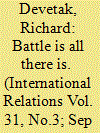

|
|
|
|
|
| Summary/Abstract |
There is an expectation today that International Relations (IR) theory ought to engage with philosophy as a meta-knowledge capable of grounding and legitimizing knowledge claims in the discipline. Two assumptions seem to lie behind this expectation: first, that only philosophy can supply the necessary meta-theoretical grounding needed; second, that theory is inherently a philosophical register of knowledge. This article treats these assumptions with scepticism. While not denying philosophy’s contribution to IR theory, the article makes the case for contextual intellectual history as an alternative mode of political and international theory. It seeks to shed light on the ‘philosophization of IR’ by depicting the broad contours of the historical and continuing rivalry between philosophy and history in the humanities and social sciences and, by reference to Machiavelli and Renaissance humanism, reminding the discipline of IR of the value of studying politics and international relations in a historical mode.
|
|
|
|
|
|
|
|
|
|
|
|
|
|
|
|
| 2 |
ID:
189408
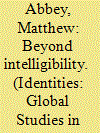

|
|
|
|
|
| Summary/Abstract |
This article explores the haunting aspects of queer migration within two documentary films: Season of Migration to the North (Laumann 2015), a film about a queer Sudanese migrant who fled to Norway after hosting a fashion show, and Shelter: Farewell to Eden (Masi 2019), a film about a Filipino transgender migrant navigating European borders. Instead of focusing on how the films make the protagonists intelligible, I focus on how absences are conjured to question the necessity of making the subject intelligible. This is important because queer migrants are often framed as only victims of persecution who must become intelligible to the demands of sexual humanitarianism. Disrupting the way visibility is heralded as an achievement for queer migrants, I explore the importance of unintelligibility in migration, especially when the terms of appearance are controlled by not only norms surrounding sexuality, gender, race, and class but also the violence of European borders.
|
|
|
|
|
|
|
|
|
|
|
|
|
|
|
|
| 3 |
ID:
102288
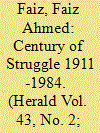

|
|
|
| 4 |
ID:
036901
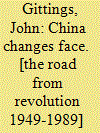

|
|
|
|
|
| Publication |
Oxford, Oxford University Press, 1989.
|
| Description |
xiv, 290p.hbk
|
| Standard Number |
0192158872
|
|
|
|
|
|
|
|
|
|
|
|
Copies: C:1/I:0,R:0,Q:0
Circulation
| Accession# | Call# | Current Location | Status | Policy | Location |
| 030799 | 951.05/GIT 030799 | Main | On Shelf | General | |
|
|
|
|
| 5 |
ID:
056677
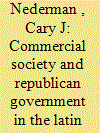

|
|
|
| 6 |
ID:
123406
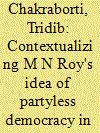

|
|
|
|
|
| Publication |
2013.
|
| Summary/Abstract |
Narendra Nath Bhattacharya (1887) and in later years known as Manabendra Nath Roy (M.N. Roy) adorns a remarkable place in the history of Indian philosophy of the twentieth century. He was a versatile scholar, a linguist, a born revolutionary, a subtle theorist, a penetrating intellectual, an uncompromising rationalist and an original thinker. Unlike the other Indian political thinkers of India, Roy has made a clear distinction between philosophy and religion in his thought. Roy's intellectual odyssey took him from militant Hindu nationalism to communism and there from to emerging as a humanist and radical democrat.
|
|
|
|
|
|
|
|
|
|
|
|
|
|
|
|
| 7 |
ID:
124422
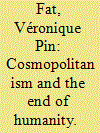

|
|
|
|
|
| Publication |
2013.
|
| Summary/Abstract |
The academic discipline of International Relations has yet to systematically begin tracing the impact of posthumanism on ethics in global politics. In a context where a humanist picture of the subject is in "a state of crisis that is more acute than ever," and the "end of humanity" is being declared by some, the question arises as to whether a moral commitment to liberal cosmopolitanism can be maintained. It arises because the moral commitments of cosmopolitanism traditionally rest on a humanist foundation, and posthumanism, at first glance, seems an obvious threat to it. In this article, rather than reading posthumanism as a threat to humanity, I read humanism as the threat. I propose that, tricky though it may be, a cosmopolitanism that embraces the end of humanity can be formulated and defended as a moral commitment to humanity: a cosmopolitanism without foundations. This cosmopolitanism without foundations is, I suggest, one way to overcome the skeptic's fantasy that we are hidden from each other, and with it the belief that our primary relation to the world is one of knowledge anchored to foundational promises of certainty. Instead, a life lived in the world with others is proposed, and with it a cosmopolitan commitment to humanity as an unavoidable ethical responsibility.
|
|
|
|
|
|
|
|
|
|
|
|
|
|
|
|
| 8 |
ID:
188668
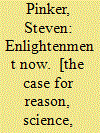

|
|
|
|
|
| Publication |
UK, Penguin Random House, 2018.
|
| Description |
xvii, 556p.: figurespbk
|
| Standard Number |
9780141979090
|
|
|
|
|
|
|
|
|
|
|
|
Copies: C:1/I:0,R:0,Q:0
Circulation
| Accession# | Call# | Current Location | Status | Policy | Location |
| 060297 | 303.44/PIN 060297 | Main | On Shelf | General | |
|
|
|
|
| 9 |
ID:
100662
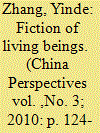

|
|
|
| 10 |
ID:
178046
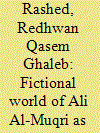

|
|
|
|
|
| Summary/Abstract |
This study aims at highlighting the artistic and intellectual vision of Ali Al-Muqri, a prominent contemporary Yemeni novelist, in The Handsome Jew, a narrative that marks a sharp departure from the works of his contemporaries in terms of its themes, technical devices, and discursive strategies. Much has been written about the relation between Muslims and Jews in the world literature. However, most, if not all, have a masculine stamp. The norm has been reversed here, Fatima, an educated Muslim woman, loves Salem, the Jew, and marries him. In contrast to the derogatory image of the Jew in literature, Salem seems open-minded and very humane. It is hypothesized that all religions are subject to interpretation according to human needs and that all religions are a source of union, not separation. Building on an eclectic theoretical framework with the analytical method, this study analyzes The Handsome Jew that is still incarcerated within the local Yemeni linguistic and cultural barrier and aims to locate the Yemeni narrative in the realm of Arabic and world literature. The conclusions of the study are as follows: despite different religions and cultures, there is a possibility for coexistence and establishing social relationships, as it happened with Fatima and Salem, who introduce a kind of sublime human reconciliation that has not touched the sacred belief of both. Learning the other’s culture and reading freely, away from the preceding and inherited views, is essential for a healthy society. It would make Muslims love the Jews and would make the Jews love the Muslims. Love is a natural humanistic energy that challenges human-made cultural barriers.
|
|
|
|
|
|
|
|
|
|
|
|
|
|
|
|
| 11 |
ID:
026113
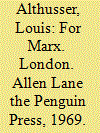

|
|
|
|
|
| Publication |
London, Allen Lane the Penguin press, 1969.
|
| Description |
272p.Hbk
|
| Standard Number |
713901098
|
|
|
|
|
|
|
|
|
|
|
|
Copies: C:1/I:0,R:0,Q:0
Circulation
| Accession# | Call# | Current Location | Status | Policy | Location |
| 004546 | 923.343/ALT 004546 | Main | On Shelf | General | |
|
|
|
|
| 12 |
ID:
135036
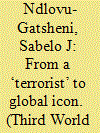

|
|
|
|
|
| Summary/Abstract |
This article examines Nelson Rolihlahla Mandela’s political life and legacy from the perspective of critical decolonial liberation ethics, which privileges a paradigm of peace, humanism and racial harmony and opposes the imperial/colonial/apartheid paradigm of war, racial hatred and separation of races. This system emerged in the 15th century and was driven by the desire to conquer, dispossess, colonise, exploit and segregate people according to race and, alongside imperatives of primitive accumulation, it informed the colonisation of South Africa and the imposition of apartheid. Mandela was a liberation fighter who provided an antidote to the colonial ideology of racial profiling and hierarchisation. What distinguished him from other freedom fighters was his commitment to the cause of human rights as early as the 1960s, long before it attained its status as a constitutive part of global normative order. When Mandela became the first black president of a democratic South Africa, his practical and symbolic overtures to whites and his reconciliatory politics aimed to call them back to a new inclusive humanity. Critical decolonial ethics logically enables a tribute to Mandela that privileges his commitment to a post-racial society and new humanism.
|
|
|
|
|
|
|
|
|
|
|
|
|
|
|
|
| 13 |
ID:
191064
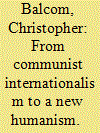

|
|
|
|
|
| Summary/Abstract |
This paper investigates the thought of the Indian revolutionary and philosopher M.N. Roy (1887–1954). The essay argues that Roy’s pivot from Marxism to a liberal ‘New Humanism’ over the course of the 1930s and 1940s was shaped by his thinking about fascism and represents a broader turn away from a materialist reading of history and loss of confidence in the Indian working class. The paper begins with an analysis of Roy’s early communism, and considers his later critique, elaborated from the 1930s onwards, that ‘Gandhism’ represented an Indian form of fascism, and explores how these arguments led to his rejection of Marxism.
|
|
|
|
|
|
|
|
|
|
|
|
|
|
|
|
| 14 |
ID:
019497
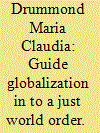

|
|
|
|
|
| Publication |
Summer 2001.
|
| Description |
173-83
|
|
|
|
|
|
|
|
|
|
|
|
|
|
|
|
| 15 |
ID:
140099
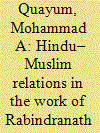

|
|
|
|
|
| Summary/Abstract |
Rabindranath Tagore (1861–1941) and Rokeya Sakhawat Hossain (1880–1932) are two stalwarts of twentieth century Bengali literature. Born and raised in very different socio-cultural and religious environments, both lacked formal education, yet both went on to become ardent champions of education. Despite their different religious identities, both writers stepped out of their cultural and gendered borders to embrace the ‘other’ in a spirit of fellowship and unity, against a backdrop of turbulent Hindu–Muslim relationships and recurrent communal riots, throughout most of their adult lives. The present article investigates this cross-cultural, dialogic-inclusive vision of Hindu–Muslim unity as reflected in the literary works of these two writers. It seeks to explain why and how they espoused such a bold vision, going against the grain of religious feuds that characterised the history of the period. The current relevance of such cross-cultural navigation is evident.
|
|
|
|
|
|
|
|
|
|
|
|
|
|
|
|
| 16 |
ID:
106415
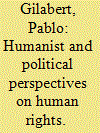

|
|
|
|
|
| Publication |
2011.
|
| Summary/Abstract |
This essay explores the relation between two perspectives on the nature of human rights. According to the "political" or "practical" perspective, human rights are claims that individuals have against certain institutional structures, in particular modern states, in virtue of interests they have in contexts that include them. According to the more traditional "humanist" or "naturalistic" perspective, human rights are pre-institutional claims that individuals have against all other individuals in virtue of interests characteristic of their common humanity. This essay argues that once we identify the two perspectives in their best light, we can see that they are complementary and that in fact we need both to make good normative sense of the contemporary practice of human rights. It explains how humanist and political considerations can and should work in tandem to account for the concept, content, and justification of human rights.
|
|
|
|
|
|
|
|
|
|
|
|
|
|
|
|
| 17 |
ID:
084518
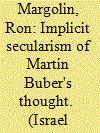

|
|
|
| 18 |
ID:
084919
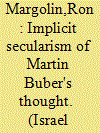

|
|
|
| 19 |
ID:
124975
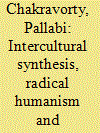

|
|
|
|
|
| Publication |
2013.
|
| Summary/Abstract |
Rabindranath Tagore imbued Indian dance and music with a new modern sensibility. He created novel and eclectic dance-and-music genres, Rabindranritya and Rabindrasangeet, when the national trend was toward classical revivalism. He inspired Indian women to dance on the national stage at a time when dance was associated with immorality and cultural degeneration. This article explores Tagore's song and dance creations, connecting them to his radical political and philosophical thought on universal humanism. Focusing on his views on creativity and freedom, nationalism and cosmopolitanism, and women and essentialism, it is argued that this eclectic intercultural synthesis of ideas served to promote individual consciousness, empowerment and cosmopolitanism without rejecting their Indic cultural roots.
|
|
|
|
|
|
|
|
|
|
|
|
|
|
|
|
| 20 |
ID:
128287
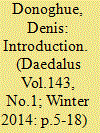

|
|
|
|
|
| Publication |
2014.
|
| Summary/Abstract |
It is a minor embarrassment that the words humanist and humanism are regularly found on the same page of big dictionaries. I should say at once, therefore, that the contributors to this issue of Dædalus are humanists because they work on the humanities and teach them, often under conditions that seem unpropitious, in colleges and universities. What they are otherwise, in their personal and social lives, is none of my business. Humanism raises a different issue. The Oxford English Dictionary gives ½ve meanings of it, in notably awkward phrasing. The predominant one refers to a tenet, an axiom, or a prejudice-depending on one's viewpoint-in the history of philosophy: A pragmatic system of thought introduced by F. C. S. Schiller and William James which emphasizes that man can only comprehend and investigate what is with the resources of the human mind, and discounts abstract theorizing; so, more generally, implying that technological advance must be guided by awareness of widely understood human needs. In some contexts, humanism has taken on
|
|
|
|
|
|
|
|
|
|
|
|
|
|
|
|
|
|
|
|
|